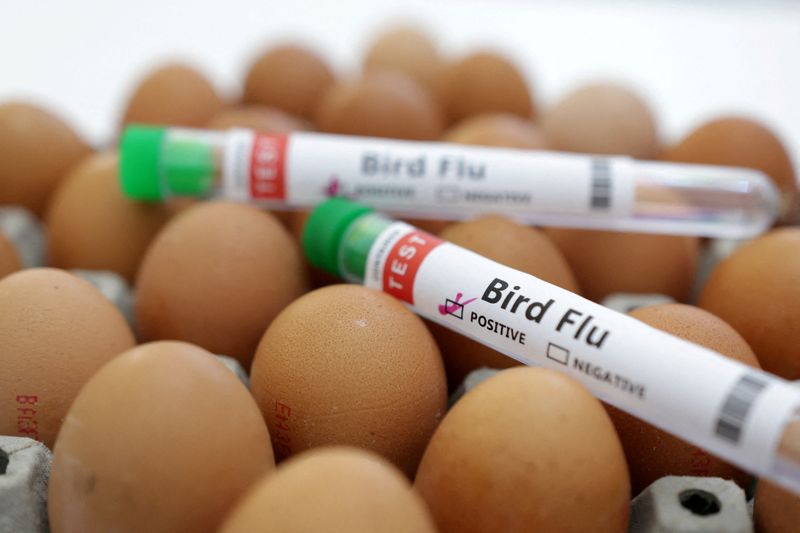
By Tom Polansek
CHICAGO (Reuters) -Migratory waterfowl are to blame for widening avian-flu outbreaks in Texas cows and poultry, and wild birds carrying the virus should be heading north soon, state Agriculture Commissioner Sid Miller said.
The U.S. government since last week has reported cases of the disease in seven dairy herds in Texas and one person who had contact with cows, making it the state most affected by the country’s first-ever outbreaks in cattle. Texas is the biggest U.S. cattle producer.
The cases in dairy cattle and the second human case in two years in the United States renewed concerns about the virus, which has been infecting poultry flocks and a growing number of other species globally since 2022.
A positive test at a Texas egg farm led egg producer Cal-Maine to cull 1.6 million laying hens, the company said on Tuesday. Texas had never before suffered such a major outbreak at a commercial poultry facility, Miller said.
“This is spread by waterfowl,” he said in an interview. “We’re ready for the ducks to head north to their nesting grounds.”
The U.S. Department of Agriculture (USDA) first reported on March 25 that a cow and milk from two dairies in Texas tested positive for bird flu, along with milk from two dairies in Kansas. The agency later confirmed cases in additional dairy herds in Texas, New Mexico, Michigan and Idaho.
The strain of the virus found in the subsequent states is very similar to the strain confirmed in the initial cases in Texas and Kansas that appear to have been introduced by wild birds, the USDA said.
Experts said feces or other materials from infected wild birds could have contaminated feed or water supplies ingested by cows at dairies, though that has not been confirmed.
USDA said it could not rule out transmission of the disease between cattle. In Michigan, the dairy herd that tested positive had recently received cows from Texas, according to the agency.
Following the outbreaks, Mexico, a major market for U.S. beef and dairy products, said it is increasing surveillance and reinforcing inspections of U.S. livestock imports.
Bird flu has primarily affected older cows at infected dairies, and “only a small portion of each herd is presenting with clinical signs,” the USDA said in an email. The agency added that it has not received reports of beef cattle showing clinical signs of sickness or samples from beef cattle to test for bird flu.
“Why dairy cattle and not beef cattle? Everyone is scratching their head,” said Michael Kleinhenz, a veterinarian and clinical associate professor of dairy cattle health at Texas A&M University.
“Here in the Texas panhandle, we have dairies next to feedlots, and cows in close proximity on range, and we’re only seeing it on dairies.”
‘DEAD BIRDS AROUND DAIRIES’
The U.S. Centers for Disease Control and Prevention considers the risk of bird flu for humans to be low. The Texas patient’s only symptom was eye inflammation, according to the state’s health department.
President Joe Biden has been briefed on the bird flu situation, White House spokeswoman Karine Jean-Pierre told reporters at a news briefing on Wednesday.
Richard Webby, a virologist at St. Jude Children’s Research Hospital in Memphis, said testing for flu in cattle is not routine and that it was important to establish the connection between the sickness in cows, and ducks and cats on the farms.
“Some smart people made the link and actually tested them for flu,” said Webby, director of the World Health Organization Collaborating Center for Studies on the Ecology of Influenza in Animals and Birds.
The Texas outbreak may have started about a month ago, when a mysterious illness affected about 40% of the state’s dairy herds, Miller said. He said he now suspects it was bird flu, though officials did not know it at the time and cannot confirm it because the animals recovered.
“We were testing for every cattle disease we could think of and then somebody said, ‘What are all these dead birds doing around the dairies?'” Miller said.
(Reporting by Tom Polansek; Additional reporting by Julie Steenhuysen and Steve Holland; Editing by Aurora Ellis and Bill Berkrot)